|
Books Should Be Free Loyal Books Free Public Domain Audiobooks & eBook Downloads |
|
|
Books Should Be Free Loyal Books Free Public Domain Audiobooks & eBook Downloads |
|
Top Authors |
|---|
|
Book type:
Sort by:
|
By: Isabella Alden (1841-1930) | |
|---|---|
 Ruth Erskine's Crosses
Ruth Erskine's Crosses
Third book in the Chautauqua Girls series. Written by Isabella Alden under the pseudonym “Pansy.” Ruth’s father brings home a wife and daughter, after 18 years, that Ruth had never known about. Suddenly she is no longer the queen of her home. And what’s worse, the new mother and sister are rude and antagonistic. How will Ruth bear this cross? | |
By: Harriet Jacobs (1813-1897) | |
|---|---|
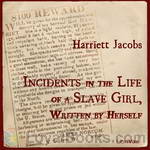 Incidents in the Life of a Slave Girl, Written by Herself
Incidents in the Life of a Slave Girl, Written by Herself
Born in slavery, but being fortunate enough to be owned by a benevolent mistress, her life takes a tragic turn when her parents and her benefactor die. The new heir to the property (and slaves) is a cruel and lewd man who begins to make inappropriate advances to the lovely young slave-girl. In a bid to escape, she becomes entangled in a relationship with a neighboring landowner who promises a better life, and she even has two children. However, things become worse for her when her cruel owner decides to punish her by sending her and her children to a distant cotton plantation to be “broken in... | |
By: W. Somerset Maugham (1874-1965) | |
|---|---|
 The Moon and Sixpence
The Moon and Sixpence
The Moon and Sixpence is a 1919 short novel by William Somerset Maugham based on the life of the painter Paul Gauguin. The story is told in episodic form by the first-person narrator as a series of glimpses into the mind and soul of the central character, Charles Strickland, a middle aged English stock broker who abandons his wife and children abruptly to pursue his desire to become an artist. | |
 On a Chinese Screen
On a Chinese Screen
This is a non-fiction collection of Maugham's observations of life in Asia in the early 20th Century. | |
By: Waldemar Bonsels (1880-1952) | |
|---|---|
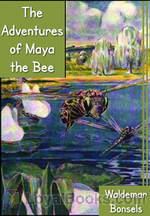 The Adventures of Maya the Bee
The Adventures of Maya the Bee
A little bee is born in a large and busy hive. At that time, the hive is going through a period of unrest and there are fears that it will become subdivided into separate colonies. The little new-born, Maya, is under the care of a strict but loving teacher. One day, driven by curiosity and rebellion, Maya escapes from the safe environs of the hive and flies into the forest. Here, she encounters all sorts of interesting, exciting, frightening and funny things. The Adventures of Maya the Bee is the story of the intriguing days that follow... | |
By: Mary Harris Jones (1830 or 1837-1930) | |
|---|---|
 The Autobiography of Mother Jones
The Autobiography of Mother Jones
Mother Jones (Mary Harris Jones) was a legendary labor organizer. She was a founding member of the International Workers of the World (the IWW, or the Wobblies), and was active in the United Mine Workers and the Socialist Party of America. | |
By: James Weldon Johnson (1871-1938) | |
|---|---|
 Word of an Engineer
Word of an Engineer
James Weldon Johnson was an American author, educator, lawyer, diplomat, songwriter, and civil rights activist. Johnson is best remembered for his leadership within the National Association for the Advancement of Colored People (NAACP), where he started working in 1917, being chosen as the first black executive secretary of the organization, effectively the operating officer. He was first known for his writing, which includes poems, novels, and anthologies collecting both poems and spirituals of black culture. | |
By: Irwin S. Cobb (1876-1944) | |
|---|---|
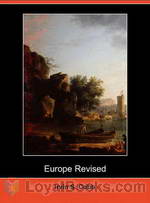 Europe Revised
Europe Revised
Irwin Cobb’s humorous Europe Revised is a travelogue and comedy almost in the style of Mark Twain. The dedication says it best, “To My Small DaughterWho bade me shed a tear at the tomb of Napoleon, which I was very glad to do, because when I got there my feet certainly were hurting me.” | |
By: Guy de Maupassant (1850-1893) | |
|---|---|
 Ball-of-Fat
Ball-of-Fat
The first significant published short story of French author Guy de Maupassant, and generally acknowledged as his greatest work, “Ball-of-Fat” (French title: Boule de Suif) is the touching story of an interrupted coach ride from Rouen to Le Havre during which occurs the corruption of a principled prostitute by immoral and hypocritical members of the upper class. The story is set during the occupation of Rouen at the time of the Franco-Prussian War. | |
 Bel Ami, or The History of a Scoundrel
Bel Ami, or The History of a Scoundrel
“He had faith in his good fortune, in that power of attraction which he felt within him - a power so irresistible that all women yielded to it.”Though firmly set in 1880s Paris, Maupassant's gripping story of an amoral journalist on the make could, with only slight modifications of detail, be updated to the 1960s, to the Reagan-Thatcher years, or maybe to the present day. Anti-hero Georges Duroy is a down-at-heel ex-soldier of no particular talent. Good-looking but somewhat lacking in self-confidence, he discovers an ability to control and exploit women - whereupon his career in journalism takes off, fuelled by the corruption of colleagues and government arrivistes... | |
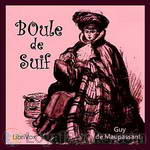 Boule de Suif
Boule de Suif
Boule de Suif (1880) is a short story by the late-19th century French writer Guy de Maupassant. It is arguably his most famous short story, and is the title story for his collection on the Franco-Prussian War, entitled "Boule de Suif et Autres Contes de la Guerre" ("Boule de Suif and Other Stories of the War"). John Ford said that his film Stagecoach was in many ways a western rewrite of Boule de Suif. | |
By: Joseph E. Badger, Jr (1848-1909) | |
|---|---|
 The Lost City
The Lost City
Bruno and Waldo Gillespie are orphaned brothers living with the extremely eccentric Professor Phaeton Featherwit. One day they set off in one of the professor’s machines to investigate a tornado at close range and accidentally get sucked into it! They are then transported by the tornado and find themselves in a barren, uncharted wasteland wherein lies a city– a long lost Aztec city! Find out what happens next to the brothers and the professor in this harrowing and exhilarating adventure! | |
By: William James (1842-1910) | |
|---|---|
 Essays in Radical Empiricism
Essays in Radical Empiricism
William James (1842 – 1910) was a pioneering American psychologist and philosopher. He wrote influential books on the young science of psychology, educational psychology, psychology of religious experience and mysticism, and the philosophies of pragmatism and Radical Empiricism. Essays in Radical Empiricism is a collection edited and published posthumously by his colleague and biographer Ralph Barton Perry in 1912. It was assembled from a collection of reprinted journal articles published from 1904–1905 which James had deposited in August 1906 at Harvard University, for supplemental use by his students. | |
 Varieties of Religious Experience
Varieties of Religious Experience
The Varieties of Religious Experience: A Study in Human Nature is a book by the Harvard psychologist and philosopher William James that comprises his edited Gifford Lectures on "Natural Theology" delivered at the University of Edinburgh in Scotland between 1901 and 1902. These lectures concerned the nature of religion and the neglect of science, in James' view, in the academic study of religion. Soon after its publication, the book found its way into the canon of psychology and philosophy, and has remained in print for over a century. | |
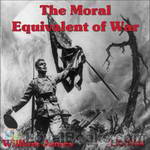 The Moral Equivalent of War
The Moral Equivalent of War
The Moral Equivalent of War, the last public utterance of William James, is significant as expressing the opinions of a practical psychologist on a question of growing popular interest. For the past fifteen years the movement for promoting international peace has been enlisting the support of organizations and individuals the world over. That this is a question on which much may be said for the opposition, James, though a pacificist, admits with his usual fair-mindedness, pointing out that militarism... | |
 Pragmatism
Pragmatism
'Pragmatism' contains a series of public lectures held by William James in Boston 1906–7. James provides a popularizing outline of his view of philosophical pragmatism while making highly rhetorical and entertaining lashes towards rationalism and other competing schools of thought. James is especially concerned with the pragmatic view of truth. True beliefs should be defined as, according to James, beliefs that can successfully assist people in their everday life. This is claimed to not be relativism... | |
By: Harry Houdini (1874-1926) | |
|---|---|
 The Right Way to Do Wrong
The Right Way to Do Wrong
Harry Houdini, master illusionist and contortionist, unmasks the various ways that criminals take advantage of their victims. | |
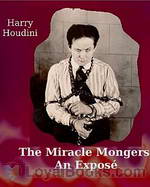 The Miracle Mongers, an Exposé,
The Miracle Mongers, an Exposé,
“A complete exposé of the modus operandi of fire eaters, heat resisters, poison eaters, venomous reptile defiers, sword swallowers, human ostriches, strong men, etc.”, [by Harry Houdini, from the subtitle]. | |
By: Vladimir Ilyich Lenin (1870-1924) | |
|---|---|
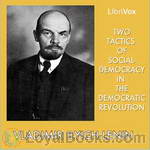 Two Tactics of Social-Democracy in the Democratic Revolution
Two Tactics of Social-Democracy in the Democratic Revolution
In the heat of the failed 1905 revolution in Russia, Lenin here contrasts the precision of the Bolshevik political program and tactics with various inconsistent and servile factions within the Russian Social-Democratic Labor Party. | |
By: W. S. Gilbert (1836-1911) | |
|---|---|
 The Bab Ballads
The Bab Ballads
The Bab Ballads are a collection of light verse by W. S. Gilbert, illustrated with his own comic drawings. Gilbert wrote the Ballads before he became famous for his comic opera librettos with Arthur Sullivan. In writing the Bab Ballads, Gilbert developed his unique “topsy-turvy” style, where the humour was derived by setting up a ridiculous premise and working out its logical consequences, however absurd. The Ballads also reveal Gilbert’s cynical and satirical approach to humour. They became famous on their own, as well as being a source for plot elements, characters and songs that Gilbert would recycle in the Gilbert and Sullivan operas... | |
By: Keith Laumer (1925-1993) | |
|---|---|
 Greylorn
Greylorn
Earth is threatened with destruction by a deadly alien plague. The planet’s only hope: Get help from the long-lost Omega Colony, somewhere in space. The fate of the Earth is in the hands of Lieutenant Commander Greylorn in charge of the search for Omega, and every decision he will make during Man’s first contact with an alien race… | |
 Gambler's World & The Yillian Way
Gambler's World & The Yillian Way
Here are two stores starring the always unconventional Terrestrial Diplomat, Retief. As a diplomat, Retief does not always follow procedure. Well the truth is that he almost never follows procedure but somehow his wit and strength manage to salvage most situations from the bumbling of his superiors. His sardonic approach to inter galactic negotiations in these two stories is a delight to hear. Despite everything, he manages to save the day and come out on top. | |
By: Fergus Hume (1859-1932) | |
|---|---|
 The Secret Passage
The Secret Passage
Excellent murder mystery. On September 9, 1905, the NY Times Saturday Review of Books described this book as follows: “That painstakingly ingenious person, Fergus Hume, has devised another of his hide-and-seek, jack-o’-lantern murder mysteries. It begins with a queer and rich old woman found stabbed to death in her chair and not a clue to the murderer. Then so many clues turn up that even the story-book detective is bewildered. Then nearly everybody turns out to be somebody else under an alias, and all the clues lead nowhere…” | |
 The Mystery of a Hansom Cab
The Mystery of a Hansom Cab
“The following report appeared in the Argus newspaper of Saturday, the 28th July, 18– “Truth is said to be stranger than fiction, and certainly the extraordinary murder which took place in Melbourne on Thursday night, or rather Friday morning, goes a long way towards verifying this saying. A crime has been committed by an unknown assassin, within a short distance of the principal streets of this great city, and is surrounded by an impenetrable mystery. … “On the twenty-seventh day of July, at the hour of twenty minutes to two o’clock in the morning, a hansom cab drove up to the police station in Grey Street, St... | |
 Madame Midas
Madame Midas
Madame Midas is a murder mystery, In the early days of Australia, when the gold fever was at its height. Fergus Hume was born in England, the second son of Dr James Hume. At the age of three his father emigrated with his family to Dunedin, New Zealand. He was admitted to the New Zealand bar in 1885. Shortly after graduation he left for Melbourne, Australia where he obtained a post as a barristers’ clerk. He began writing plays, but found it impossible to persuade the managers of the Melbourne theatres to accept or even read them... | |
 The Silent House
The Silent House
A mystery about a “locked door” murder committed in a house that has a reputation for being haunted. In the first half of the book, the murderer appears to be easy to figure out. The second half of the book, however, is filled with plot twists and mistaken identities and thus complicates the mystery much more. | |
 Bishop's Secret
Bishop's Secret
| |
By: P. G. Wodehouse (1881-1975) | |
|---|---|
 The Girl on the Boat
The Girl on the Boat
Also published as "Three Men and a Maid". The maid of the title is red-haired, dog-loving Wilhelmina "Billie" Bennet, and the three men are Bream Mortimer, a long-time friend and admirer of Billie, Eustace Hignett, a lily-livered poet who is engaged to Billie at the opening of the tale, and Sam Marlowe, Eustace's dashing cousin, who falls for Billie at first sight. All four find themselves on an ocean liner headed for England together, along with a capable young woman called Jane Hubbard who is smitten with Eustace, and typically Wodehousian romantic shenanigans ensue. (Introduction by wikipedia) | |
 Little Nugget
Little Nugget
Mrs Nesta Ford, in her London hotel room, reveals to her new friend Lord Mountry that she hopes to take her son Ogden on a yachting trip proposed by Mountry, despite her ex-husband having won custody of the boy. As Mountry leaves, Cynthia Drassilis arrives with Ogden, whom she has led away from his father's country house. Mrs Ford rewards Cynthia, but soon Mr Ford's secretary, a Mr Minnick, arrives to recover the stolen child. Cynthia tries to bribe his colleague, Mrs Sheridan, but to no avail, as she believes Nesta's influence has spoiled the boy... | |
By: M. M. Mangasarian (1859-1943) | |
|---|---|
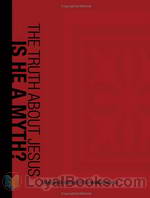 The Truth About Jesus. Is He a Myth?
The Truth About Jesus. Is He a Myth?
The following work offers in book form the series of studies on the question of the historicity of Jesus, presented from time to time before the Independent Religious Society in Orchestra Hall, Chicago, 1909. No effort has been made to change the manner of the spoken, into the more regular form of the written, word. | |
By: John Keats | |
|---|---|
 John Keats: Selected Poems
John Keats: Selected Poems
John Keats is perhaps the most talented poet of the English Romantic Period. Although his life was cut short by disease at the age of 25, he produced some of the most famous poems in world literature. Less erudite and philosophical than Shelley and not so technically versatile as Byron, he displayed a sure poetic instinct and an amazing ability to appeal powerfully to the senses and to the emotions by the brilliance of his diction. Thus his poetry is noted more for exquisite feeling than for thought, but in his particular sphere he was unmatched. His influence upon later poets has been immense. (Introduction by Leonard Wilson) | |
 Poems 1817
Poems 1817
Early poems of this famous English lyric poet, in which he openly expresses indebtedness to, and reverence for, his poetic predecessors, especially Spenser, into whose chivalric world he boldly ventures; and also for Milton, and the classic poets. There are also glimpses of his personal, family and political relationships. These poems are of medium length and often pastoral and contemplative in nature with many classical references. His lyric genius and love for humanity are clearly displayed.( Peter Tucker) | |